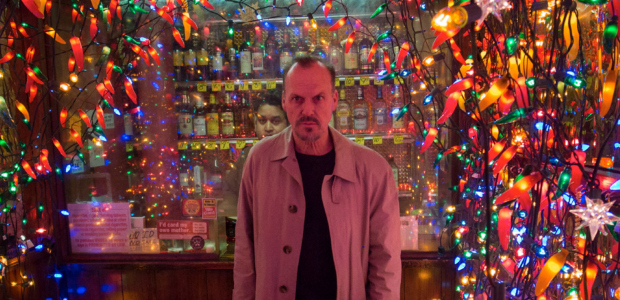Birdman
Overtly magical, covertly heartbreaking, Birdman is the soaring of hope, delusion, despair and madness, the soaring of a heart as a meteor that refuses to crash into the ground.
Plot summary
An actor famous for portraying an iconic superhero struggles to mount a Broadway play. In the days leading up to opening night, he battles his ego and attempts to recover his family, his career, and himself.

Michael Keaton is an American actor in his sixties who had, earlier on in his career, an admirable run of intelligent, worthy roles on stage and in films, but then became a movie star, playing a comic book superhero called Batman. He never seemed to quite go anywhere from there (because you can’t, really), losing his hair a bit, getting jowls. After Batman, his work is often referred to as ‘other notable work.’
Thomas Riggan is an American actor, probably in his early sixties, who had a distinguished career before taking on the role of a comic book superhero called Birdman. After turning down the fourth installment, his career foundered. He’s lost hair, gained jowls, and because his perch as a top tier movie star has vanished, as has the spoils of his blockbuster roles, he attempts to resurrect not really his career but his soul by directing and starring in (and producing with what’s left of his money) a Broadway show called What We Talk About When We Talk About Love, based on a short story by Raymond Carver (and, actually, a really good idea.)
Birdman is, of course, not a documentary—Michael Keaton remains fiercely intelligent, agile, and successful in his other notable work—but it is one of the mischievous touches in Inarritu’s exhilarating excoriation of a script. The characters scathe, their voices as scatological and rude as bar buddies who don’t really like each other: George Clooney, Ryan Gosling, and ‘that clown’ Robert Downey Jr. are fleetingly in the crosshairs, as is the vapidity of critics who affix labels on the whims of their unearned self-importance and how much they drink, costing them nothing but which can cost an artist his very livelihood, his very life. Also treated without mercy is the self-delusional narcissism of Hollywood, the callous selfishness of the young and the existential immaturity of the ageing, and even—oops—the Oscars, which is described as a bunch of untrained hacks giving themselves awards for ‘cartoons and porn’ (that clip probably won’t make it on the program on February). The acid spews delightfully as though from an untapped fire hydrant, with the chillingly pragmatic precision of Ted Bundy; in one of many superb insights, we’re reminded that Farrah Fawcett died the same day that Michael Jackson did—fame and Hollywood egos are more fragile and yet more tenacious than mortal coils—even tragedy and death get ratings. Who remembers the drug death of Edward Furlong after the drug death of Heath Ledger a couple of days later? This witty, giddy, hilarious, and—I’m loath to say—uplifting film is that it is no joke.
Birdman is something new. It plays with the backstage Broadway genre (like Noises Off), Hollywood satire (like Barton Fink), some bald slapstick (like, well, like any slapstick), fantasy, surrealism, and psychotic breaks, but is much more. It plays with the very ontology of cinema, self-reflexive and allusive, and toying with the nature of the diegesis, as the characters periodically stumble across the drummer playing the (superb) soundtrack in unexpected places. There’s even some Mickey Mousing. But the most astonishing technical achievement, is, well, virtuosic is almost too weak a word: besides cuts in the beginning and at the end, it is essentially one long take (though not in real time), but in the way that Hitchcock’s Rope was one long take. Instead of going into a character’s back to change reels (though there are some witty allusions to this), Birdman is, of course, digitally assisted and accomplished by the genius of cinematographer Emmanuel Lubezki. The camera glides, glowers, intrudes, tells its own jokes, its movements creating ellipses of possibly weeks, and the intriguing joins in the film feel like heart palpitations, like the feeling you get when a roller coaster starts to descend. It’s dizzying.
In 2000 (ish) Alejandro Inarritu released Amores Perros, a gorgeous, meticulously crafted film of outstanding storytelling and structure. Around that same time, Alfonso Cuaron released Y Tu Mama Tambien, a rough gem of a film, with outstanding storytelling and performances. These two films heralded the Mexican New Wave, and we were awed and celebratory. It didn’t last long. How could it? Inarritu and Cuaron didn’t cast themselves as the next great New Wave. We did. They were just filmmakers, looking to make movies, and with bigger budgets (who wouldn’t? Ken Loach?). So off they moved, to Hollywood, to Europe, and made bigger films. Are they the pals the contemporaneity in my own mind would suggest? Like Truffaut and Godard? Last year Cuaron won the Oscar for directing, and his career has been more luminous, perhaps, and considerably more commercial. Is this Inarritu’s turn? Inarritu didn’t take the crowd-pleasing, blockbuster, genre-film route, but remained an art house epic filmmaker, being able to afford fewer cars, no doubt, but keeping truer to his more human, less high concept early work. There is no installment on his CV. But here he’s bested Cuaron at his own game—taking Cuaron’s penchant for long, long takes and trumping him raw with his own weapon—technical bravura but coupled with a story of isolation, desperation, and existential quandary. Overtly magical, covertly heartbreaking, Birdman is about soaring: soaring of hope, soaring of delusion, soaring of despair and madness, soaring of a heart as a meteor that refuses to crash into the ground.










COMMENTS